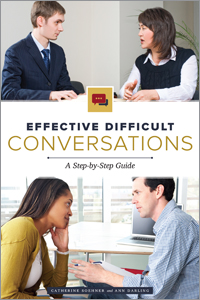Primary tabs
You don't need to be an ALA Member to purchase from the ALA Store, but you'll be asked to create an online account/profile during the checkout to proceed. This Web Account is for both Members and non-Members.
If you are Tax-Exempt, please verify that your account is currently set up as exempt before placing your order, as our new fulfillment center will need current documentation. Learn how to verify here.
- Description
- Table of Contents
- About the authors
- Reviews
Listen to a podcast about this book now!
In an information landscape where change is the status quo, difficult conversations come with the territory. Being a library leader means knowing how to confidently steer these conversations so that they lead to productive results instead of hurt feelings, resentment, or worse. Employees in a library will also encounter conflict, especially during times of change. Using a step-by-step process, this book walks readers through learning the skills to have effective difficult conversations that hold themselves and others accountable. Practice activities throughout the book will help readers feel prepared beforehand. After reading this book, library directors, managers, administrators, and team leaders will feel empowered to
- proactively identify situations that require an intervention in order to avoid unnecessary complications or confrontations down the line;
- prepare for and initiate a difficult conversation, balancing a clear message with compassion to successfully manage change or handle personnel issues;
- diffuse volatile emotions by maintaining a calm, measured approach; and
- follow up a difficult conversation in writing, keeping the lines of communication open to ensure a way forward.
Illustrated with real-world examples of both successful and unsuccessful difficult conversations, this book will serve as an important leadership tool for handling change and conflicts in the library workplace.
Acknowledgments
Introduction
Chapter 1 Difficult Conversations Defined
Chapter 2 Getting Clear
Chapter 3 Gathering Resources
Chapter 4 Clarifying the Message
Chapter 5 During the Conversation
Chapter 6 You're Not Finished Until You Write It Up
Chapter 7 Keep Up the Good Work
Chapter 8 Coworkers
Chapter 9 A Brief Note about Change Management
Chapter 10 Managing Up—How to Have Difficult Conversations with Your Boss
Conclusion
References
Index
Catherine B. Soehner
Catherine B. Soehner is the Associate Dean for Research and User Services at the University of Utah’s J. Willard Marriott Library. She is responsible for most public services in the Library with a focus on faculty outreach, student services, and campus collaborations. Catherine has served as a manager and leader of libraries for 20 years at the University of California in Santa Cruz and the University of Michigan. Her recent publications and presentations have focused on crisis communication, holding effective difficult conversations, and change management.
Ann Darling
Ann Darling is the assistant vice president of undergraduate studies, and an associate professor in the Communication Department at the University of Utah. She has been in leadership positions in higher education since 1996. Together, they have provided presentations on "effective difficult conversations" as part of the University of Utah Leadership Development Program since March 2013. The success of their presentation broadened their reach across campus and they began providing the same presentation for the Health Sciences Leadership Development Program for a total of four presentations each year.
"Buy a copy immediately and put it near your desk!"
— Teacher Librarian
”The book provides a formulaic method of structuring a difficult conversation: from defining the difficult conversation, to determining what the party initiating the difficult conversation wants to say, to the ebbs and flows of said difficult conversation, to documenting the results of the conversation. By relying on a formula and preplanning the conversation, difficult conversations can be structured in a way that does not digress into an emotional shouting match … The skills discussed in the book help librarians perfect the soft skills that are necessary to serve all patrons.”
— ARBA
”This book is definitely a realistic fit for the managerial toolbox … A welcome guide for managers just starting out or for those already on the job, moreover, this book can serve as the pivot for continuing professional education about the importance of communication skills in the workplace."
— Catholic Library World
”Each of the ten chapters provides practical and relevant advice for employees and employers who may find themselves engaged in a difficult work-related conversation."
— Library Journal



